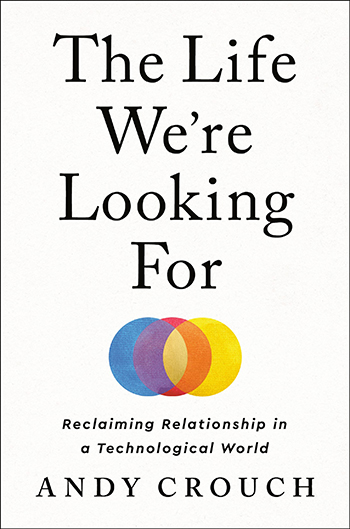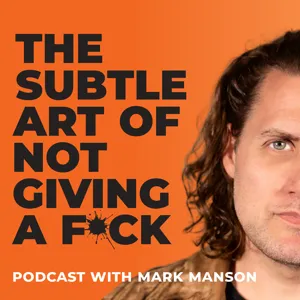Podcast Summary
Understanding Our Desires for Love and Connection: Technology can hinder individual development and relationships. We need to redesign our relational lives and create 'households' for genuine human connection.
Technology, while providing convenience and connection, can also hinder our individual development and interpersonal relationships. Andy Crouch, author of "The Life We're Looking For," discusses the importance of understanding our desires as complex beings who yearn for love and connection. He differentiates between personalized and personal interactions and the use of devices versus instruments. Crouch argues that we need to redesign our relational lives and create "households" to foster genuine human connection. Brett McKay and Andy Crouch explore the trade-offs of seeking magic without mastery and the importance of understanding the impact of technology on our lives.
Technology's coercive quality and hidden burdens: Technology expands our capabilities but also limits them in ways we may not fully consider, making us feel ambivalent towards it.
Technology, while offering new capabilities and convenience, also comes with hidden burdens and requirements. This coercive quality of technology is often not discussed during the sales process. For instance, getting a smartphone to check soccer practice times may seem beneficial, but it becomes a requirement as other methods become obsolete. Similarly, the ability to listen to recorded music anywhere, anytime, has made it less likely for people to learn to make music themselves. These trades-off contribute to the ambivalence we feel towards technology. In essence, technology expands our capabilities but also limits them in ways we may not fully consider. This is a theme explored in the author's latest book, "The Life We're Looking For."
The cost of advanced technology: Technology offers conveniences but may hinder personal growth and human connection, requiring balance in our pursuit of a fulfilling life
Our pursuit of advanced technology, which we sometimes view as a form of magic, comes with trade-offs. While technology offers conveniences and powers, it may also diminish our internal capabilities for growth and connection. This idea is explored throughout history, from the Faustian bargain in literature to the use of technology in modern life. Ultimately, we are looking for a fully personal life, characterized by heart, soul, mind, strength, and love. Technology can provide distractions when the quest for real life fails, but it should not replace the importance of human connection and development.
The role of technology as a compensating simulation for real-world complexities: Technology offers a limited simulation of human complexities (heart, soul, mind, strength), often leaving us disconnected from a holistic human experience
Technology serves as a compensating simulation for the real world's complexities and frustrations, providing an easier and more efficacious sense of power and capacity. This idea stems from the Hebrew Bible's concept of being human, which encompasses heart (emotion and desire), soul (depth of self), mind (reason and cognition), and strength (embodiment). Modern life, particularly our reliance on technology, often neglects one or more of these aspects, leaving us disconnected from a holistic human experience. The technological world offers a limited simulation of the heart, soul, mind, and strength complex, and we've lost the normal experience of their active collaboration in daily life.
Ancient philosophers believed interacting with the world is essential for growth: Ancient philosophers believed engaging with the natural world and overcoming resistance are key to personal growth, while modern technology can hinder this development by making life easier and disconnecting us from the earth.
Technology, while convenient, can hinder our development as fully human beings. Ancient philosophers like Plato and CS Lewis believed that the soul consists of multiple parts, and interacting with the world and other people is essential for growth in all areas: heart, soul, mind, and strength. Modern philosopher Wendell Berry emphasizes the importance of recognizing ourselves as creatures bound to the earth, and facing the world's challenges as part of our development. Interacting with the natural world and overcoming resistance are key to personal growth. Technology, however, can make life easier and less challenging, potentially hindering our development. This disconnection from the natural world and resistance may contribute to feelings of loneliness, anxiety, and depression. We must make a conscious effort to engage with the world and each other to foster growth and meaningful connections.
The Cost of Control and Easy Relationships: Technology's control and ease in relationships can rob us of human qualities like vulnerability, recognition, and growth.
While technology offers control and ease in our relationships, it also makes us less human and less resilient. Sheri Turkle's research shows that people prefer texting because they're in control of the message, but this comes at the cost of real relationships which involve vulnerability and improvisation. Technology allows us to interact with like-minded individuals, creating an "easy everywhere" environment, but we lose the ability to handle disagreements and persuade others. The quest for control and easy relationships may seem appealing, but it ultimately robs us of the very things that make relationships valuable and human: recognition, vulnerability, and growth.
The importance of bridging differences in person: Technology can't replace human connections. Seek out authentic relationships despite differences.
While technology can provide personalized experiences, it cannot truly replicate the depth and complexity of personal connections with other humans. The speaker emphasizes the importance of encountering and bridging differences with others in order to foster meaningful conversations and relationships. However, with the increasing reliance on technology and screens, we risk becoming isolated in echo chambers, unable to persuade or understand those with differing perspectives. The speaker also highlights the danger of mistaking personalized experiences for genuine personal connections, as technology becomes more sophisticated at simulating the real thing. Ultimately, the goal should be to seek out and engage in authentic personal relationships, despite the challenges and differences that may arise.
Technology can't replace genuine human connection: Overreliance on technology for personal relationships can lead to dehumanization, while genuine human interactions are essential for authentic connections.
While technology can provide personalized experiences and automate tasks, it cannot replace genuine human connection. The speaker emphasizes that devices and automated messages may seem personalized, but they lack the ability to truly understand or care for individuals. In fact, the overreliance on technology for personal relationships can lead to dehumanization and a loss of authentic connection. The speaker also highlights that technology shapes us in ways we may not realize, as we become accustomed to its use and it reshapes our behaviors and thought patterns. It's essential to be mindful of these effects and prioritize genuine human interactions in areas that matter most.
Devices vs Instruments: The Impact on Creativity and Growth: Technology as devices can hinder creativity and growth by replacing human effort and engagement, while instruments amplify and channel our contributions, fostering new skills and abilities.
Technology, particularly devices, can train us to seek shortcuts and avoid challenges, which can hinder creativity and growth. Instruments, on the other hand, fully engage us and help us develop new skills and abilities as we use them. The distinction between devices and instruments is crucial in understanding how technology can enhance or detract from our lives. Devices replace human effort and engagement, while instruments amplify and channel our contributions. It's essential to redesign technology with this distinction in mind, focusing on creating instruments that fully involve us and help us grow.
Transforming devices into instruments: Technology should be designed to enhance abilities and experiences, not just provide convenience or distraction. With practice, even a smartphone can be transformed from a draining device into a life-enhancing instrument.
Technology should be designed to enhance our abilities and experiences rather than simply providing us with convenience or distraction. The speaker argues that we should aim for instruments that allow us to engage more fully with the world, rather than devices that isolate us and make us feel depleted. A device is something that requires little skill and leaves us feeling drained, while an instrument is something that makes us feel more alive and allows us to let go when we're done. With discipline and practice, even a smartphone can be transformed from a device into an instrument. The hope is that we can shift our focus towards technology that empowers us and enhances our lives, rather than just providing us with momentary pleasures.
Reimagining Technology as a Tool for Deep Connection: Shift mindset to view tech as tool, foster intentional communities like households for deeper human connection, and redesign technology and social architecture to promote meaningful relationships and a fulfilling life beyond the screen.
Technology can be reimagined as a tool rather than a compulsive habit if we approach it with intention. This requires a shift in our mindset and a supportive community. True human connection and relationships are found in households - living spaces where people intentionally share their lives with each other for an extended period. Households offer a deeper and more lasting connection than digital devices, which often leave us feeling empty and less human. The redesign of technology and our social architecture are essential for fostering meaningful relationships and a fulfilling life beyond the screen. Living in intentional communities, such as households, can provide the necessary proximity and duration to overcome the superficiality and transactional nature of our modern relationships.
The importance of households for deep relationships: Modern living lacks depth, households offer solution, but technology can't replace the involuntary layer of being known that comes from living in close proximity to others.
Our modern, atomized way of living, even in relationships and communities, is not enough to foster the deep, complex relationships we crave. Households, with their integrated environments and shared experiences, offer a solution to this problem. However, technology, such as co-working spaces and group texts, can only simulate this experience and do not replace the involuntary layer of being known that comes from living in close proximity to others. To truly be known and build meaningful relationships, we need environments where people will notice when we're absent or in distress, and where we can't help but be known in all our facets as a person. Unfortunately, not enough of us have such environments in our lives.
Exploring deeper connections through shared experiences and pilgrimages: Deep connections require more than digital communication; consider embarking on a challenging, extended journey with others to forge deeper bonds.
Building deep, meaningful connections with others requires more than just digital communication. While tools like group chats can help facilitate relationships, they don't replace the power of shared experiences and extended time spent together. Author Andy Crouch suggests the idea of a "pilgrimage" - a challenging, extended journey with others - as a way to forge deeper connections. This can be costly and scary, but the rewards are worth it. To learn more about this concept and how to apply it to your own life, check out Andy Crouch's book "The Life We're Looking For" and visit his website, AndyCrouch.com. For practical resources and tools to build ventures and businesses that prioritize deep relationships, visit Praxislabs.org.










!["i don't chase i attract" [video]](https://www.podcastworld.io/podcast-images/anything-goes-with-emma-chamberlain-ro26h70m.webp)


